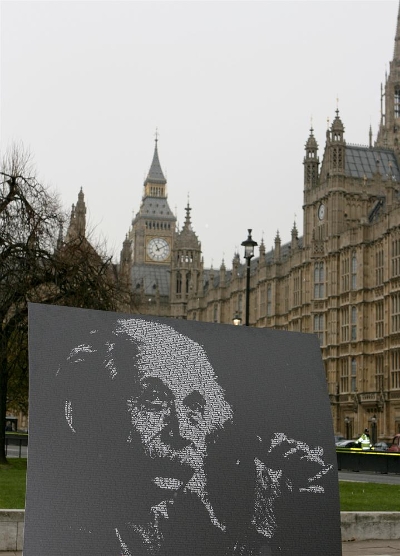Giant Albert Einstein joins union protests in Parliament
15 December 2009
A giant Albert Einstein was in Westminster today for a photo opportunity as part of protests by UCU against plans to change research funding.
The giant image of Einstein was created using some of the 18,000 signatures to a petition against the proposals.
 'If we knew what it was we were doing, it would not be called research, would it?'
Einstein's image was chosen by UCU because one of his quotes about research sums up the union's campaign. Talking about research he famously said: 'If we knew what it was we were doing, it would not be called research, would it?'
'If we knew what it was we were doing, it would not be called research, would it?'
Einstein's image was chosen by UCU because one of his quotes about research sums up the union's campaign. Talking about research he famously said: 'If we knew what it was we were doing, it would not be called research, would it?'
The proposals, announced by Higher Education Funding Council for England (HEFCE) in September, have been condemned by the academic community as an attack on curiosity-driven research. UCU said if researchers had been operating under the new guidelines, which would force 25% of future research to be assessed on 'economic impacts', many crucial discoveries would have been missed. The union will also deliver the petition and its submission to the consultation on the funding proposals to HEFCE tomorrow.
The signatories come from the full range of academic disciplines and include six Nobel Prize winners and over 3,000 professors. The union is handing every signature over to HEFCE as part of its evidence against plans it says would 'strangle talent and destroy initiative.'
Signatories to the UCU petition include Sir Tim Hunt (Nobel Prize winner); Sir John Walker (Nobel Prize winner); Sir Harold Kroto (Nobel Prize winner); Sir Richard Roberts (Nobel Prize winner); Professor Brian Josephson (Nobel Prize winner); Professor Venkatraman Ramakrishnan (Nobel Prize winner); Professor Richard Dawkins; Professor Denis Noble; Professor Steven Rose; Professor Steve Jones; Professor Don Braben Professor John Dainton; (all scientists); Professor Fritz Ursell; Sir John Ball (both Mathematics); Sir Tony Wrigley; Dame Janet Nelson (both History); Professor Jonathan Glover; Professor James Ladyman (Philosophy); Professor T J Clark (Art History); Professor Allyson Pollock (Public Policy); Professor Richard Sennett (Sociology).
UCU general secretary, Sally Hunt, said: 'Where are the next generation of Albert Einsteins going to come from if we seek to control research in this way? History has taught us that some of the biggest breakthroughs have come from speculative research and it is wrong to try and measure projects purely on their economic potential. If implemented these plans would strangle talent and destroy initiative.
'Academic research benefits all of society and we shouldn't be looking to reduce it to a series of 'impact indicators'. If the government wants Britain to be a world leader in innovation it should be listening to the thousands of academics who have signed our petition, not the siren calls of big business.'
Sir Tim Hunt, one of six Nobel Prize winners to sign the petition, said: 'The impact guidelines will discourage academics from making discoveries and will encourage people to come up with unoriginal research proposals. The whole idea of research is to find out things that you didn't know before. The fruits of basic research are unpredictable and to seek to control them in this way is not in the interests of the country.'
According to Professor Donald Braben, Honorary Professor, Department of Earth Sciences at the University College London and one of more than 3,000 professors to sign the petition: 'Virtually every major scientific discovery ever made would not have survived the current proposals with the emphasis on economic impact.'
UCU has produced a report that looks in greater detail at how some of our most crucial breakthroughs would not have been discovered without curiosity-driven research. To view that report visit:
![]() Discoveries that would not survive the REF [84kb]
Discoveries that would not survive the REF [84kb]
- PrintPrint this page
- Share


Comments